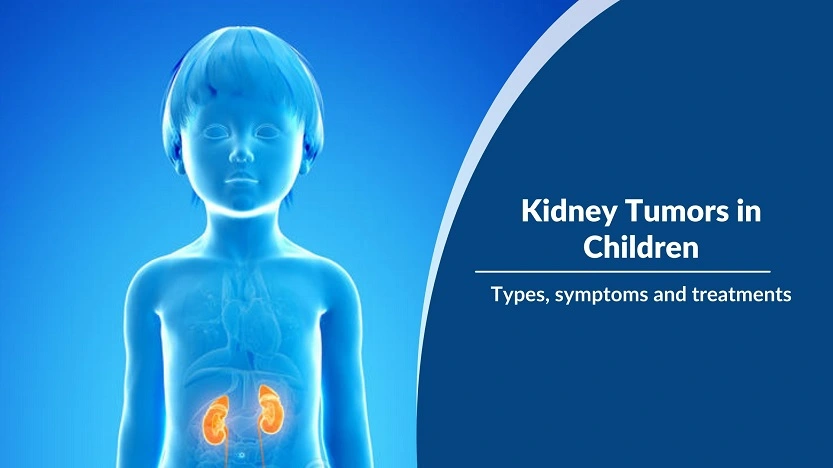Introduction
The kidneys are organs in the abdomen that remove waste and extra water from the blood (such as urine) and help keep chemicals (such as sodium, potassium, and calcium) balanced in the body. The kidneys also make hormones that help control blood pressure and stimulate the bone marrow to make red blood cells. Childhood kidney tumors are diseases in which cancer cells form in the tissues of the kidney. Kidney tumors are of different types like Wilms tumor which is the majority of kidney tumors and includes a number of symptoms which are listed below
The types of childhood kidney tumors are enumerated below:
- Wilms Tumor
- Renal Cell Cancer (RCC)
- Rhabdoid Tumor of the Kidney
- Clear Cell Sarcoma of the Kidney
- Congenital Mesoblastic Nephroma
- Ewing Sarcoma of the Kidney
- Primary Renal Myoepithelial Carcinoma
- Cystic Partially Differentiated Nephroblastoma
- Multilocular Cystic Nephroma
- Primary Renal Synovial Sarcoma
- Anaplastic Sarcoma of the Kidney
- Nephroblastomatosis is not cancer but may become Wilms tumor.
I need to mention every time to my patients and caregivers that having certain genetic syndromes, other conditions, or environmental exposures can increase the risk of Wilms tumor. Tests are used to screen for Wilms tumor. Also having certain conditions may increase the risk of renal cell cancer.
Treatment for Wilms tumor and other childhood kidney tumors includes genetic counseling– need of the hour.
kidney tumor signs and other childhood kidney tumors include a lump in the abdomen and blood in the urine which is the chief complaint as well in many of the cases.
Tests that examine the kidney and the blood are used to diagnose Wilms tumor and other childhood kidney tumors. Certain factors affect prognosis (chance of recovery) and treatment options.
Wilms Tumor
In Wilms tumor, one or more tumors may be found in one or both kidneys and may spread to the lungs, liver, bone, brain, or nearby lymph nodes. In children and adolescents younger than 15 years old, most kidney cancers are Wilms tumors.
Renal Cell Cancer (RCC)
Renal cell cancer is rare in children and adolescents younger than 15 years old. It is much more common in adolescents between 15 and 19 years old and may spread to the lungs, liver, bone, or lymph nodes. Renal cell cancer may also be called renal cell carcinoma.
Rhabdoid Tumor of the Kidney
It is a type of kidney cancer that occurs mostly in infants and young children & is often advanced at the time of diagnosis. Rhabdoid tumor of the kidney grows and spreads quickly, often to the lungs or brain.
SMARCB1 gene-related tumor
Children with a certain change in the SMARCB1 gene can also have tumors grow in the kidney, brain, or soft tissues. These children are checked regularly to see if a rhabdoid tumor has formed in the kidney or the brain. Children from birth or diagnosis to 5 years old have an MRI of the brain and spine and an ultrasound of the abdomen every 3 months.
Clear Cell Sarcoma of the Kidney
Clear cell sarcoma of the kidney is an uncommon kidney cancer that may spread to the bone, lungs, brain, liver, or soft tissue & occurs most often before age 3 years. It may recur up to 14 years after treatment, often in the brain or lung.
Congenital Mesoblastic Nephroma
Congenital mesoblastic nephroma is a tumor of the kidney that is often diagnosed during the first year of life or before birth i.e. in infants younger than 6 months old and is found more often in males than in females. It can usually be cured.
Ewing Sarcoma of the Kidney
Ewing sarcoma of the kidney is rare and usually occurs in young adults. This cancer grows and spreads to other parts of the body quickly.
Primary Renal Myoepithelial Carcinoma
Primary renal myoepithelial carcinoma is a rare type of cancer that usually affects soft tissues but sometimes forms in the internal organs such as the kidney. This type of cancer grows and spreads quickly.
Cystic Partially Differentiated Nephroblastoma
Cystic partially differentiated nephroblastoma is a very rare type of Wilms tumor made up of cysts.
Multilocular Cystic Nephroma
Multilocular cystic nephroma is a benign tumor made up of cysts and is most common in infants, young children, and adult women. These tumors can occur in one or both kidneys. Children with this type of tumor also may have pleuropulmonary blastoma, so imaging tests that check the lungs for cysts or solid tumors are done. Since multilocular cystic nephroma may be an inherited condition, genetic counseling and genetic testing need to be considered.
Primary Renal Synovial Sarcoma
a cyst-like tumor of the kidney and is most common in young adults. These tumors grow and spread quickly.
Anaplastic Sarcoma of the Kidney
a rare tumor that is most common in children or adolescents younger than 15 years of age. Since anaplastic sarcoma may be an inherited condition, genetic counseling and genetic testing may be considered.
Signs and symptoms may be caused by kidney tumors or by other conditions any of the following:
- A lump, swelling, or pain in the abdomen.
- Blood in the urine.
- High blood pressure (headache, feeling very tired, chest pain, or trouble seeing or breathing).
- Hypercalcemia (loss of appetite, nausea, vomiting, weakness, or feeling very tired).
- Fever for no known reason.
- Loss of appetite.
- Weight loss for no known reason.
- Wilms tumor that has spread to the lungs or liver may cause the following signs and symptoms:
- Cough.
- Blood in the sputum.
- Trouble breathing.
- Pain in the abdomen.
There are different types of treatment for patients with Wilms tumor and other childhood kidney tumors.
Six types of treatment for Kidney Tumors are:
- Surgery
- Radiation therapy
- Chemotherapy
- Immunotherapy
- High-dose chemotherapy with stem cell rescue
- Targeted therapy
- New types of treatment are being tested in clinical trials.
Written by Dr. Sajjan Rajpurohit – a renowned and esteemed international Medical Oncologist/Cancer specialist based in Delhi NCR with 17plus years of experience and has treated more than 94000 cancer patients- still serving humanity with pride.
Also read:
About Ependymoma Brain Tumor, Its Symptoms, Types, And Treatments


